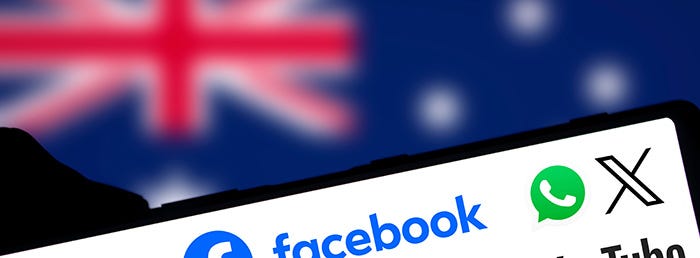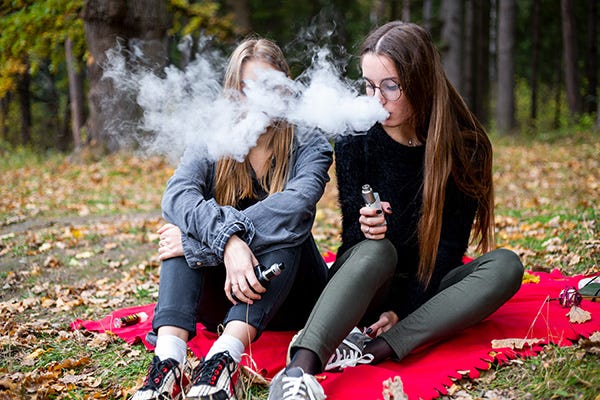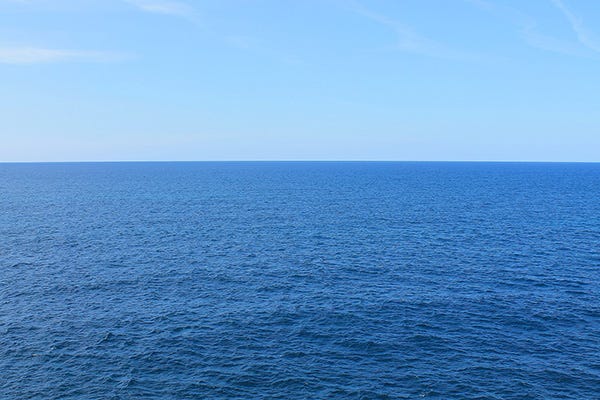Should America Do What Australia Just Did and Ban Social Media For People Under the Age of 16?
I thought we should at first!
While you were busy stuffing your face with overrated bird meat and watching mostly uninteresting football, Australia was making history. On November 28th, the country’s Parliament passed the first-ever law banning children under the age of 16 from using social media.
Under the new measure, platforms would be required to prevent users under the age of 16 from having accounts. Failure to do so could result in fines of up to $50 million Australian dollars, which is around $32.5 million in real American money.
In a statement before the Parliament vote, Australian Prime Minister Anthony Albanese called social media “a platform for peer pressure, a driver of anxiety, a vehicle for scammers and, worst of all, a tool for online predators” and said he wants young Australians “off their phones and onto the footy and cricket fields, the tennis and netball courts, in the swimming pool.”
At first glance, this strikes me as an obviously good idea. One recent study showed that 67 percent of American parents believe children under 18 need government-fueled protection from the horrors of the internet in some way. Measures to restrict social media access for kids have similar support among parents in Europe. As for Australia, if the government is to be believed, 77 percent of the public wanted this ban to happen.
Is it a bit of a crackdown on kids’ freedom? Sure, but adults tell kids what they can and cannot do all the time. Like how the boomers decided the youngs shouldn’t be able to smoke delicious candy-flavored nicotine vapes anymore.
That might not seem like an appropriate comparison, but with vaping and social media both, we are talking about things that have a detrimental effect on physical and mental health for people of all ages, but kids especially.
I also don’t buy any arguments about a social media ban cutting kids off from “vital technology” that they need to succeed in life. I know it might not seem like it, but there is a whole bunch of internet that exists outside of social media. No one is saying kids can’t use the world wide web, they just can’t go into the parts that are psychological warzones is all.
It’s also hard to ignore the efforts of online safety activists like Australia’s Sonya Ryan. Her 15-year-old daughter was murdered by a 50-year-old pedophile who pretended to be a teen on social media. At a hearing held the Monday prior to the vote, a witness apparently shared a similar story when speaking out in favor of the bill, according to The Guardian.
Weirdly, that’s where things get tricky. That same Guardian reporting mentions that she was the only witness who was in favor of the ban. Everyone else who spoke and wasn’t the government was against it, and that doesn’t just include the kid who showed up standing on another kid’s shoulders wearing a trench coat and a fake mustache.
Sure, there’s strong support among the general public, but have you met the general public? They don’t know shit. When it comes to experts with a dog in the fight, it seems like all of them were against this ban.
Case in point, Suicide Prevention Australia executive director Christopher Stone, who said supporters of the ban weren’t taking into account the “positive aspects of social media in supporting young people’s mental health and sense of connection.”
The lack of support gets worse. When explaining the need for the ban, Australian Communications Minister Michelle Rowland referenced a 2022 study about the negative effects of social media on young girls. An Australian outlet that is, of course, called Crikey reached out to one of the authors of that study, University of Oxford Professor Andrew Przybylski, and got the following quote about his work:
“I do not agree that it provides the justification for this policy. I think they have misunderstood the purpose and findings of our research.”
Did you know Australia already has an “eSafety Commissioner” who is responsible for implementing policies and regulations meant to protect kids online? Her name is Julie Inman Grant and … guess what? She also does not support this ban, despite being the government official who will be most responsible for implementing it.
When it was still just being tossed around as a proposal, she likened it to “banning kids from the ocean instead of teaching them how to swim.”
After the ban was passed, the commissioner’s office released a statement acknowledging that they know the law exists, but pointed to the overwhelming lack of support and said their current work would continue unchanged.
On top of the worries over the negative impacts the ban could have on kids and their mental health and social connections, there are also massive privacy concerns. The Australian government swears it won’t be the case, but it’s hard to imagine any way for this to work that doesn’t involve sending your ID or passport to social media companies so they can verify your age.
There are lots of good reasons to not want to send your ID to the tech bros, with the possibility of data breaches being a really big one.
In fact, back in 2023, Australia toyed with the idea of forcing adult websites to implement age verification measures but ended up backing down on account of that exact possibility. Here’s a quote!
“It is clear from the roadmap at present, each type of age verification or age assurance technology comes with its own privacy, security, effectiveness or implementation issues.”
They’re ready to give it another shot, though! Earlier this year, it was announced that Australia would be launching an online age verification pilot program.
Hilariously, just a few hours after that announcement, it was revealed that hackers made off with the user data of more than one million customers of bars in the New South Wales area. By law, those bars have to scan customers’ faces using a system that matches those scans with drivers license details. A security expert interviewed by TechDirt suggested that victims replace their license, adding “there are physical addresses, there are dates of birth, there are names. That’s not good.”
Just because the government is the one saying you have to send your details to these sites doesn’t mean your information will enjoy government-level data encryption or anything of the like when it gets there. That part is up to the bar/porn site/social media platform in question.
Beyond all of those concerns, the Guardian points out that an aggressive campaign by News Corp, the people who bring you Fox News, was responsible for a lot of the public support behind the ban, and that they just happened to launch that campaign after Meta announced they wouldn’t be entering into any new deals to pay for news.
Even though I think social media is a cancer and that kids should not be on it, I find it hard to support Australia’s social media ban in light of what seems like nearly unanimous opposition from people who know better than I do.
So it’s a good thing I’m not in Australia! As long as Elon Musk is still our future and forever DOGE Czar or whatever he’s doing here in the United States, the chances of this happening here are slim to none. If anything we’ll probably just sanction and/or invade Australia over it someday.
Want more international news, but with voices and extra people? If so, check out this week’s episode of You Don’t Even Like This Show!








If risks to your personal information are the issue, the government could theoretically create an internet age verification id where a site offering restricted material would take that ID and then need to redirect to a government website where you would have to enter in a password or whatever to validate that its your ID.
It just seems like the dichotomy so often comes down to “kids health” vs. “identity security.” I don’t mean that in a positive or negative way - just an observation about the way the conversation is framed into a sort of “them or you” fight card. I would say this: our kids and my Wife all handle the internet a heck of a lot better than I do. My Wife keeps in touch with friends from yore. That’s about it. One of our kids is trans, and they handle online bullying by counter-punching like a coked up wolverine. I’m jealous. Our other kids have online friends who they’ve known for over a decade, yet still know how to vote kick with impunity. So maybe it is more about learning how to swim and knowing your depth than banning the ocean. I’m kinda hoping for some sort of “Bay Watch Compromise,” but talk like that could get a guy flagged.